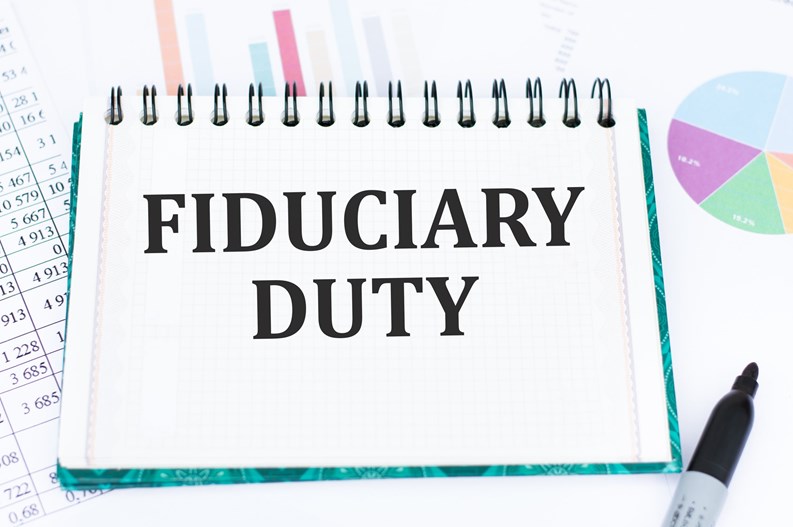As members of co-op corporations and condominium associations, we often hear the term fiduciary duty bandied about. But what does it really mean to be a fiduciary? Stated simply, the term ‘fiduciary’ means trust. When a person managing the finances or property of another person or group is acting as a fiduciary, that means they must act in the best interest of the person or group, rather than themselves. And it’s not just a matter of ethics—fiduciary duty is a legal obligation to maintain that trust.
A Deeper Dive
According to Jack Boselli, a senior vice president with FirstService Residential in New Jersey, there are two components to fiduciary responsibility: duty of loyalty, and duty of care. “Duty of loyalty,” explains Boselli, “requires board members to act in good faith to promote the best interests of the entire association. Duty of care requires board members to make informed decisions–which might require a bit of research —before acting or voting on a matter before the board.” Boselli also notes there is a duty for boards and board members to act within the scope of their authority.
William McCracken, a partner with Moritt Hock & Hamroff, a law firm based in New York City, delves a little deeper: “We are concerned with two fiduciary duties—the duty of care and the duty of loyalty. These are concepts that attorneys learn in the first year of law school, but there’s a universe of issues, permutations, and challenges associated with both duties, even just in the co-op/condo/HOA context. The duty of care requires board members to exercise reasonable care and diligence in their decision-making process. This is frankly a fairly low bar for most board members, but unfortunately not everyone clears it. You have to show up to meetings, you have to keep yourself informed. Sometimes people will sue the board because they have a problem (a water leak, mold, or a noisy neighbor) that they feel that the board should have done a better job fixing.”
“The duty of loyalty,” McCracken continues, “requires an undivided and undiluted” loyalty to those whose interests the fiduciary is to protect. That means setting aside any individual interests you may legitimately have as a shareholder or unit owner when you are acting in your capacity as a board member. This comes up in all sorts of contexts. When someone employed as a real estate broker joins a board, for example, are they giving their undivided, undiluted loyalty to the building, or are they looking for inside information to help them in their business?”
“Simply put,” says Mark Hakim, an attorney with Schwartz Sladkus Reich Greenberg Atlas, also located in New York City, “each director or committee member maintains a special relationship with the shareholders or unit owners such that they are required to make decisions and carry out their duties on behalf of the shareholder/owners in good faith, and with the best interests of the building in mind. When elected to serve on the board or on any committee, regardless of their status at the building as a unit owner or shareholder, they are required, as set forth in Section 717 of New York’s Business Corporations Law (BCL), to ‘serve, in good faith and with that degree of care which an ordinarily prudent person in a like position would use under similar circumstances…’ ”
It’s Not About You
Upholding fiduciary responsibility is paramount for board members, so one might reasonably assume that the vast majority of board members always act with good intent. While that may be true most of the time, infractions do occur, intentionally or unintentionally. So, what are the potential ramifications of a board or committee member not upholding their fiduciary duty?
“When a fiduciary duty is breached,” says Joan Berg, a partner with Chicago-based law firm Schoenberg Finkel Beederman Bell Glazer, “the harmed party–in this case the unit owner or the association–may seek enforcement through common law, state law, or through equitable remedies to restore the injured party to their original position through restitution, injunction to address breaches of fiduciary duty, or rescission.”
Along this line of thinking, Berg continues. “Directors, as part of their fiduciary duty, must act with the care, diligence, and skill that a reasonably prudent person would exercise in similar circumstances. This involves making informed decisions and acting responsibly. For example, when choosing a vendor, the directors should seek multiple bids and interview vendors in order to make an informed decision and act responsibly on behalf of the association. Full disclosure must be provided by a director when seeking consent in a conflict of interest situation. The director must provide the principal with all relevant information needed for the board and/or the association to make informed decisions.”
Ellen Shapiro, a partner with Allcock Marcus, a law firm located in Braintree, Massachusetts, adds that “fiduciary responsibility in a condominium is an absolute duty to the association, and not to any one person or yourself: not you, your friend, your neighbor, but to the association as a whole. As a general rule, any time you work with someone else’s money, you are a fiduciary, and there is the same appropriate standard. The biggest mistake board members often make is that they think they have this power and they can use it unilaterally—but it’s only to be used for the benefit of the entire association.”
Some Real-Life Examples
While financial mismanagement–or even outright fraud–might be the first thing that comes to mind when we think about what constitutes a breach of fiduciary duty, that’s not the only way a fiduciary might find him–or herself–crosswise with the law. For example, Hakim notes that discriminatory conduct is another example of breach of fiduciary duty, and not the only one by a long shot:
“We often see breaches of fiduciary duty when a board member engages in discriminatory conduct, selectively enforces rules or policies, breaches confidentiality, or self-deals and profits from their role as a board member.” Throwing work to a relative or friend is another very common breach, he continues. “One of our client communities had a board member whose relative owned a company that was doing business with the building, but the relationship had not been disclosed. The shareholders were none too pleased, and ultimately the board member was removed and the contract with their relative’s company canceled. All of that would’ve been avoidable if it had just been disclosed, and the non-interested board members, as permitted by the BCL, had voted on the matter.”
Boselli cites a similar situation in which “A board member was an owner of a vendor that submitted proposals to provide services to the association, but they didn’t disclose their ownership and financial interest to the other board members. Even with advising other board members, trustees or directors should always avoid these situations.”
Shapiro recalls an incident that occurred some years ago: “I had an association where one board trustee, the treasurer, used association funds to advance a dog track investment, and altered records [to conceal the theft]. He said the association’s insurance premium was paid, etc. He took the policies and whited out the old dates for the current. Everyone thought they had coverage. They didn’t. When they got wise to him and what he was doing, they removed him—and he had to sell his home to pay the judgments against him. At the end of day, the risk you run is too high to take.”
Sometimes a fiduciary issue isn’t about profiting unfairly from one’s position on the board, but about conflict between one’s dual status as both a board member and a resident of the building. “It can be tempting for a board member to be involved on ‘both sides’ of the issue, but that cannot be allowed to happen,” says McCracken. “I once had a board member bring a lawsuit against their building for disrupting the use of their terrace during some facade work, and they had to be persuaded not to try to participate in operational decisions about that same facade work. One question that any fiduciary must answer is, ‘To whom I owe a fiduciary duty?’ There’s a surprising amount of fuzziness about this, and it can be difficult to give a clear answer in some cases. For cooperatives, you owe fiduciary duties to the corporation.”
Berg notes another example of a board member putting their own interests before the greater good of the community:
“At the decision of the entire association, a board completed a study of its 30-year-old roof which strongly recommended that the roof be replaced. Then the board changed. The new board—except for one director—was in favor of hiring a roofing consultant and obtaining competitive bids to review. That one director opposed the roof replacement and was able to sway other owners to pressure the board to postpone the work. Under that pressure, the board decided to table discussions with the roofing consultant but opened discussions with local roofers to get better estimates for the roof replacement.”
“In late spring of the same year, the board–except for that one director–determined that regardless of the timing for the roof replacement, a special assessment was needed in order to pay for the project. The opposing director again artfully convinced the majority of owners that a special assessment wasn’t needed.”
But then, says Berg, the plot thickened. “That summer,” he says, “the opposing director remodeled his kitchen—a complete gut replacement with high-end installations.”
“Then winter came,” Berg continues. “And heavy snow persisted. A portion of the roof collapsed, requiring immediate repairs–including over the opposing trustee’s brand-new kitchen. According to the roofer who did the work, the collapse would’ve been avoided had the roof been replaced earlier that year. The board arranged for both the immediate repairs and the complete replacement of the roof—the cost of which was almost 25 percent higher than the estimates received earlier in the year. It emptied the association reserves.”
“While not tragic,” points out Berg, “this example raises the question of whether the opposing director was more interested in renovating his own unit’s kitchen, allowing personal choices to cloud his judgment and ultimately interfere with acting in the best interests of the association.”
The bottom line is that serving on one’s condo, co-op, or HOA board is just that: service. It’s a legal obligation to make good-faith decisions on behalf of the whole community; it’s not an opportunity to enrich oneself or one’s associates, or to get a leg up on personal projects by leveraging board power for one’s own benefit. That’s the heart of fiduciary duty, and board service itself.
A J Sidransky is a staff writer/reporter for CooperatorNews, and a published novelist. He may be reached at alan@yrinc.com.










Leave a Comment